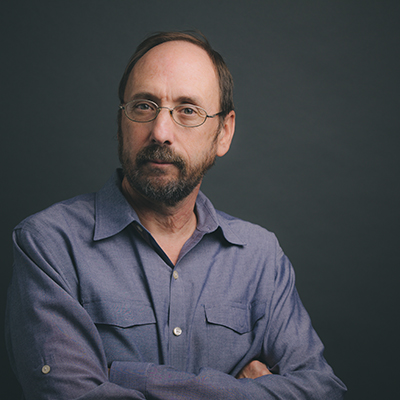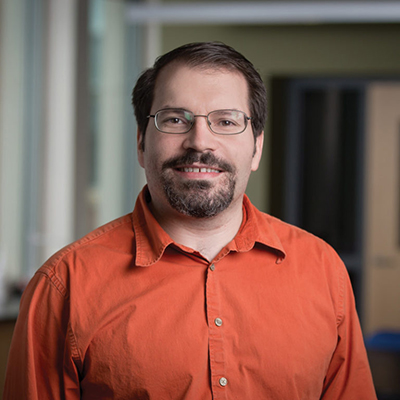Furman awarded two NSF grants totaling $720,000
The National Science Foundation’s Major Research Instrumentation program provides funding for equipment and infrastructure for labs across the country, and rarely does it issue two awards to the same university in the same year.
But in winning two grants, Professor of Chemistry George Shields and Associate Professor of Biology Jason Rawlings have secured nearly $720,000 in funding, benefitting students not just at Furman, but across South Carolina’s Upstate region and the country as a whole.
Shields was awarded two grants this year, the NSF MRI grant and a smaller one from the Research Corporation for Science Advancement. The first, a $400,000 award through the NSF MRI program, will add a computer cluster to National Science Foundation-funded consortium founded and directed by Shields that includes 38 computational chemistry faculty from across the country. Members of the group, the Molecular Education and Research Consortium in Undergraduate Computational Chemistry (MERCURY), share high performance computing resources and meet at an annual conference. MERCURY has provided opportunities for more than 1,000 students and 38 faculty members, with substantial participation from underserved populations, to work on computational chemistry research projects and share findings at conferences and in published work.
Shields serves as the principal investigator, along with co-principal investigators Carol Parish at the University of Richmond and Maria Gomez at Mt. Holyoke College.

Professor of Chemistry George Shields.
“The faculty and the students in the consortium are very diverse,” Shields said. “We’ve got a really good track record of sending students on to graduate school, the majority of them women and underrepresented students.”
In addition, Shields received a Cottrell Instrumentation Supplement award from the Research Corporation for Science Advancement. He is a Cottrell Scholar, one of a group of high achieving physics, chemistry and astronomy faculty members at primarily undergraduate institutions, who are committed to both teaching and research. The $13,300 grant will allow for the acquisition of computing nodes to support experimental research at Furman, augmenting the computer cluster made possible by the NSF MRI award.
“That means that all of my Furman colleagues will be able to have accounts on the cluster and will be able to have their students do some computations, and we’ll help them with it,” Shields said.
Both awards serve to lift up the work of others.
“At this point in my career, that’s mostly what I’m interested in – trying to make the people around me better and bring them more opportunities to become better,” he said. “That’s national and that’s local.”
Shields said that computational chemistry is a unique field in the time of a pandemic because it can be done remotely. Shields worked with an extended network of students and colleagues over the summer, even during quarantine, some of whom are doing work related to understanding COVID-19.
“They learn by trial and error just like you learn when you are doing experiments,” he said. “This equipment is allowing science to get done by scientists who are still able to do this no matter how long this situation goes on with the coronavirus.”
As for the second NSF MRI grant, it is the first of its kind to be awarded to Furman’s Department of Biology in nearly two decades. Rawlings, the principal investigator, is joined by Professor of Chemistry Timothy Hanks and Assistant Professor of Biology Srikripa Chandrasekaran as co-principal investigators, along with Professor of Biology Pamela Hanson and Assistant Professor of Biology Linnea Freeman, Associate Professor of Chemistry Brian Goess and Austin Shull, assistant professor of biology at Presbyterian College who serve as senior personnel on the grant. Neval Erturk, professor of biology at Converse College, is also a participant on the grant.
The three-year award is the largest single NSF grant ever awarded to a member of Furman’s biology department. It provides nearly $320,000 to support the acquisition of a flow cytometer to enhance research and training in the Upstate.

Associate Professor of Biology Jason Rawlings.
“What makes the instrument remarkable is that it permits the rapid analysis of entire populations of cells or similarly sized objects by looking at fluorescence of target molecules,” Rawlings said. “While this technology was initially developed for immunology, it is now routinely applied across diverse areas of biology and related sciences.”
The instrument affords both speed and multiplexing, analyzing 35,000 cells per second and up to 12 different fluorescent parameters plus two physical parameters, permitting the study of rare populations of cells, such as stem cells, and simultaneous analysis of many aspects of cellular function.
“The new flow cytometer will allow Furman students to engage in cutting-edge research not possible with our existing equipment, and will provide unique opportunities for cross-disciplinary collaboration.”
The flow cytometer will be used in both research and in the laboratory portions of classes. The equipment will be available to students who are on Furman’s campus to do research from other institutions, such as Presbyterian College, Converse College and Bridges to a Brighter Future, Furman’s comprehensive college access and success program.
“It is really going to deepen the impact not only at Furman but across the Upstate,” Rawlings said. “The goal of the NSF MRI program is to increase infrastructure, both on the research end of things and – as a secondary component – the teaching end of things.
And at Furman, those two areas bleed together, he said.
“Research really is how we engage students,” said Rawlings. “This new piece of equipment will allow us to do just that.”